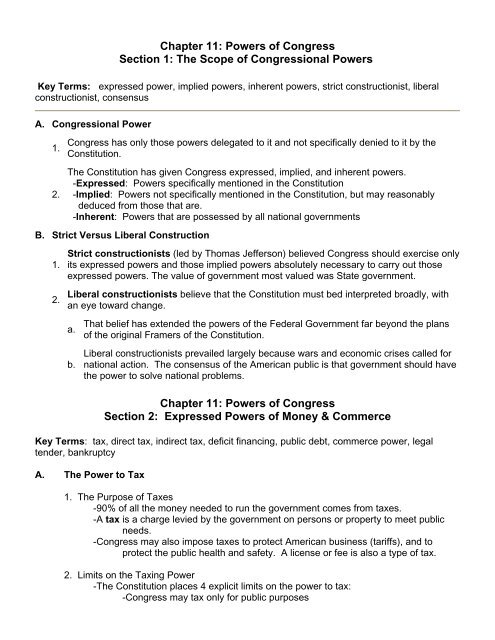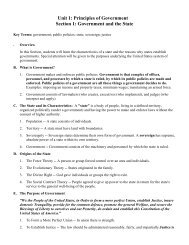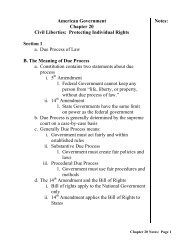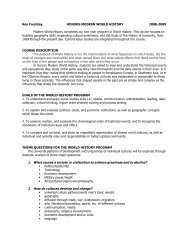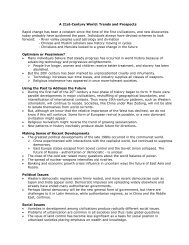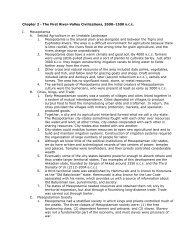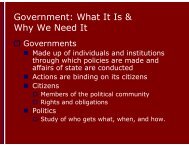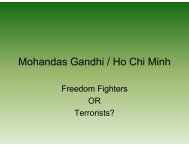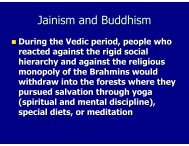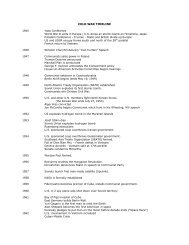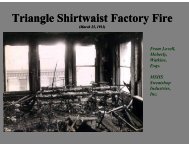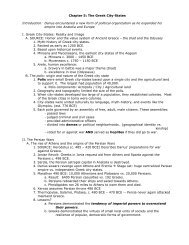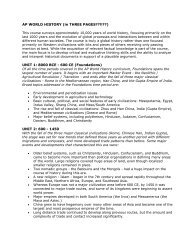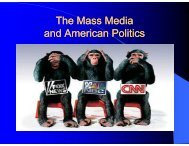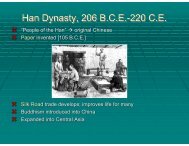Chapter 10: The Congress
Chapter 10: The Congress
Chapter 10: The Congress
Create successful ePaper yourself
Turn your PDF publications into a flip-book with our unique Google optimized e-Paper software.
<strong>Chapter</strong> 11: Powers of <strong>Congress</strong>Section 1: <strong>The</strong> Scope of <strong>Congress</strong>ional PowersKey Terms: expressed power, implied powers, inherent powers, strict constructionist, liberalconstructionist, consensusA. <strong>Congress</strong>ional Power1.2.<strong>Congress</strong> has only those powers delegated to it and not specifically denied to it by theConstitution.<strong>The</strong> Constitution has given <strong>Congress</strong> expressed, implied, and inherent powers.-Expressed: Powers specifically mentioned in the Constitution-Implied: Powers not specifically mentioned in the Constitution, but may reasonablydeduced from those that are.-Inherent: Powers that are possessed by all national governmentsB. Strict Versus Liberal Construction1.2.Strict constructionists (led by Thomas Jefferson) believed <strong>Congress</strong> should exercise onlyits expressed powers and those implied powers absolutely necessary to carry out thoseexpressed powers. <strong>The</strong> value of government most valued was State government.Liberal constructionists believe that the Constitution must bed interpreted broadly, withan eye toward change.a.b.That belief has extended the powers of the Federal Government far beyond the plansof the original Framers of the Constitution.Liberal constructionists prevailed largely because wars and economic crises called fornational action. <strong>The</strong> consensus of the American public is that government should havethe power to solve national problems.<strong>Chapter</strong> 11: Powers of <strong>Congress</strong>Section 2: Expressed Powers of Money & CommerceKey Terms: tax, direct tax, indirect tax, deficit financing, public debt, commerce power, legaltender, bankruptcyA. <strong>The</strong> Power to Tax1. <strong>The</strong> Purpose of Taxes-90% of all the money needed to run the government comes from taxes.-A tax is a charge levied by the government on persons or property to meet publicneeds.-<strong>Congress</strong> may also impose taxes to protect American business (tariffs), and toprotect the public health and safety. A license or fee is also a type of tax.2. Limits on the Taxing Power-<strong>The</strong> Constitution places 4 explicit limits on the power to tax:-<strong>Congress</strong> may tax only for public purposes
<strong>Chapter</strong> 11: Powers of <strong>Congress</strong>Section 3: Other Expressed PowersKey Terms: naturalization, copyright, patent, eminent domainA. Foreign Relations Powers1. <strong>The</strong> National Government has more power in the field of foreign relations than in anyother area. <strong>The</strong> states are specifically prohibited by the Constitution from taking partin foreign affairs.2. <strong>The</strong> foreign relations powers come from 2 sources:-From various expressed powers, especially the war powers & the power to regulateforeign commerce-Because the US is a sovereign nation, it has the inherent powers to act on mattersthat affect the security of the nation3. <strong>Congress</strong> shares its foreign relations powers with the PresidentB. War Powers1. <strong>Congress</strong> shares its war powers with the President.2. <strong>Congress</strong> has extensive powers:-Only <strong>Congress</strong> can declare war-<strong>Congress</strong> has the power to raise & support armies & to maintain a navy-It has the power to make rules pertaining to the governing of the military-It has the power to call forth the militia-It has the power to grant letters of marque and reprisal-It has the power to make rules concerning captures on land and waterC. Other expressed powers1. <strong>Congress</strong> establishes the rules for naturalization2. <strong>Congress</strong> has the postal power of the nation3. <strong>Congress</strong> sets the rules concerning copyrights and patents4. <strong>Congress</strong> is authorized to fix the standard of weights and measures for the nation5. <strong>Congress</strong> has the power to acquire, sell, and manage the territory of the US. Thisincludes the right of eminent domain, or the right to take private land for public use.<strong>Chapter</strong> 11: Powers of <strong>Congress</strong>Section 4: <strong>The</strong> Implied PowersKey Terms: appropriate, Necessary & Proper Clause, doctrineA. Necessary & Proper Clause1. <strong>The</strong> Necessary & Proper Clause gives <strong>Congress</strong> the power to use implied powers.2. <strong>The</strong> Clause says that <strong>Congress</strong> can make all laws “necessary & proper” to carry out all ofthe expressed powers.3. All implied powers are based on an expressed power in the Constitution.
B. Battle Over Implied Powers1. Hamilton & the liberal constructionists believed the Necessary & Proper Clause gavethem the power to do whatever was necessary to carry out the expressed powers.Specifically, they wanted to set up a National Bank to manage the currency andfinances of the nation.2. Jefferson and the strict constructionists believed that the nation possessed only theexpressed powers and the absolute minimum of implied powers to make thegovernment function.3. <strong>The</strong> battle over implied powers was finally decided by the Supreme Court in McCulloch vMaryland in 1819. <strong>The</strong> battle was over the right of <strong>Congress</strong> to establish a nationalbank in order to regulate the currency. <strong>The</strong>y had no way to fight the establishment ofthe first bank, since in was in Washington DC. <strong>Congress</strong> sought to establish the 2 ndBank in the state of Maryland. This allowed the strict constructionists to assert theirpower over the bank. <strong>The</strong>y had the state of Maryland place a tax on all currencyissued from the bank. <strong>The</strong> intention was to break the power of the bank. <strong>The</strong> bankdeliberately issued bills without paying the tax, and the head cashier was arrested.<strong>The</strong> case was appealed to the Supreme Court . <strong>The</strong>ir ruling said that the creation ofthe bank was a power implied by several of the expressed powers of the Constitution,and that its creation was necessary & proper to the execution of those expressedpower. Not only did this assert the liberal constructionist view of the Constitution, italso asserted the power of the National government over the states.4. In practice, the necessary and proper clause has come to mean “convenient and useful”.<strong>Chapter</strong> 11: Powers of <strong>Congress</strong>Section 5: <strong>The</strong> Nonlegislative PowersKey Terms: successor, impeach, acquit, perjury, censure, subpoenaA. Constitutional Amendments1. Article V of the Constitution grants <strong>Congress</strong> the power to propose Constitutionalamendments by a 2/3 vote in each house.2. This process has been used 33 times so far.3. Article V also provides for proposal using a national convention if requested by 2/3 of theState Legislatures. This process has never been used.B. Electoral Duties1. <strong>Congress</strong> has electoral duties that are only exercised in very unusual circumstances.2. According to the 12 th Amendment, the House would be required to choose a President ifno candidate received a majority of votes in the Electoral College. <strong>The</strong> House wouldchoose from among the top 3
electoral vote-getters. <strong>The</strong> voting would be 1 vote per state, for a total of 50 votes,with a majority required to elect.3. <strong>The</strong> Senate would select the Vice President if no candidate received a majority of thevotes in the Electoral College. <strong>The</strong> procedures would be similar to those used by theHouse, except that each Senator gets one vote, for a total of <strong>10</strong>0 votes, with amajority required to elect.4. In addition, the 25 th Amendment provides for a successor if the office of Vice Presidentbecomes empty. In this case, the President would choose a new Vice President, butthe successor would be subject to a majority approval by both Houses of <strong>Congress</strong>.C. Impeachment1. <strong>The</strong> Constitution allows for the removal of the President, VP, and all civil officers of theUS. <strong>The</strong>y may be removed for treason, bribery, or other high crimes andmisdemeanors.2. Removal is a two-part process, First, the House determines if there is sufficient evidenceto bring charges, and second, the Senate holds the trial. <strong>The</strong> House has the solepower to impeach, or bring charges. <strong>The</strong> Senate has the sole power to try, or tojudge, in impeachment cases. <strong>The</strong> House may bring charges with a majority vote,while a conviction in the Senate requires a 2/3 vote.3. <strong>The</strong>re is one restriction in the Senate. If it is the President being impeached, the personwho presides over the Senate must be the Chief Justice of the Supreme Court.4. To date there have been 17 impeachments in the House, with 7 eventually found guilty inthe Senate. All 7 of those found guilty have been federal judges.5. Two Presidents have been impeached, Andrew Johnson and Bill Clinton. Both werefound not guilty in the Senate. Richard Nixon resigned rather than face impeachmentover the Watergate affair.D. Executive Powers1. Appointments2. Treaties-All major appointments made by the President must be approved by a 2/3 vote ofthe Senate.-<strong>The</strong>re is a long-standing tradition called “Senatorial Courtesy”. According to thistradition, if the President makes an appointment to a federal position whoseregion lies entirely with a state, and that state’s Senator objects to theappointment, and the Senator is from the President’s party, then the Senatewill automatically turn down the appointment.-<strong>The</strong> President makes treaties “by and with the Advice and Consent of the Senate”.A treaty must be approved by 2/3 of the Senate.
E. Investigatory Power1. <strong>Congress</strong> has the power to investigate matters of interest.2. Investigations take place through the standing committees of <strong>Congress</strong>.


